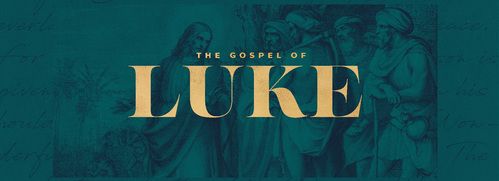Friday Devo

Scripture Reading:
Luke 24
25 Then Jesus said to them, “You foolish people! You find it so hard to believe all that the prophets wrote in the Scriptures. 26 Wasn’t it clearly predicted that the Messiah would have to suffer all these things before entering his glory?” 27 Then Jesus took them through the writings of Moses and all the prophets, explaining from all the Scriptures the things concerning himself.
25 Then Jesus said to them, “You foolish people! You find it so hard to believe all that the prophets wrote in the Scriptures. 26 Wasn’t it clearly predicted that the Messiah would have to suffer all these things before entering his glory?” 27 Then Jesus took them through the writings of Moses and all the prophets, explaining from all the Scriptures the things concerning himself.
Commentary from the ESV Study Bible:
24:25 O foolish ones is a more precise translation than “O foolish men,” because the Greek text does not specify whether these were two men or a man and a woman (perhaps a husband and a wife) walking together.
24:26 Was it not necessary refers to the fact that the entire OT had shown how God brought his chosen leaders first through suffering and then to glory. Therefore the Messiah himself, in fulfillment of this extensive pattern and in fulfillment of many prophecies, would also first suffer before entering into his glory (see 9:22; cf. 24:44). This glory, foreshadowed in 9:32, comes at his resurrection and then more fully at his ascension into heaven (22:69; Acts 2:33; 7:55; 22:6–11; Phil. 2:8–11; Heb. 1:3).
24:27 Moses and all the Prophets refers to the entire OT, also summarized as all the Scriptures. Jesus explained to them how not only the explicit prophecies about the Messiah but also the historical patterns of God’s activity again and again throughout the OT looked forward to Jesus himself.
24:26 Was it not necessary refers to the fact that the entire OT had shown how God brought his chosen leaders first through suffering and then to glory. Therefore the Messiah himself, in fulfillment of this extensive pattern and in fulfillment of many prophecies, would also first suffer before entering into his glory (see 9:22; cf. 24:44). This glory, foreshadowed in 9:32, comes at his resurrection and then more fully at his ascension into heaven (22:69; Acts 2:33; 7:55; 22:6–11; Phil. 2:8–11; Heb. 1:3).
24:27 Moses and all the Prophets refers to the entire OT, also summarized as all the Scriptures. Jesus explained to them how not only the explicit prophecies about the Messiah but also the historical patterns of God’s activity again and again throughout the OT looked forward to Jesus himself.
Study Questions:
- At The City, we developed a tool to help all of us remember WHY we believe what we believe. We think it's important for us to be able to have reasonable answers to questions about God, Jesus, the Bible, and why we choose to follow him. Most people, even faithful believers, think faith is something that you just have to take blindly. But we can have the assurance of knowing that the things we believe are actually rooted in reasonable and historical evidence. Have you ever given much thought to your faith and why you believe the things you do? Wouldn't you like to be able to articulate your reasons for your faith beyond, "I believe because that was what I was taught?"
- This week's City 7 is #7... You can read it below. Many people today, who are uninformed, don't trust the Bible because of all the years that have passed since the original manuscripts were written, because of the number of different translations that are available, etc. The bottom line is this: We serve a good and gracious Heavenly Father who WANTS us to have and know his Word. It would be in his best interest, and ours, for us to have an accurate account. Let's face it, if God can raise Jesus from the dead, he can certainly protect the writing and copying of scripture over the years. When you read scripture, is there ever a hint of doubt that what you are reading is true? How much confidence do you put in his Word? Can you truly say you trust that it is absolute truth?
Pray:
- That you would strive to know why you believe the things you believe.
- That your life would be built on the truth of God's Word.
This Week's City 7:
Try to commit to memory!
7. How can I trust that the Bible is still God’s Word today? I trust the Bible is still God’s Word today because Jesus rose from the dead proving He was God and said His words would never pass away. Through the Holy Spirit, God inspired the writing of the Scripture, determined the canon of Scripture and protected the copying of Scripture so that we might know Him and worship Him to this day.
(Matthew 24:35; 2 Timothy 3:16; 2 Peter 1:16-21; Revelation 22:18-19)
(Matthew 24:35; 2 Timothy 3:16; 2 Peter 1:16-21; Revelation 22:18-19)

No Comments